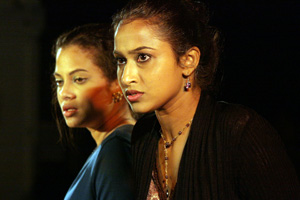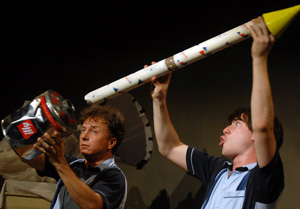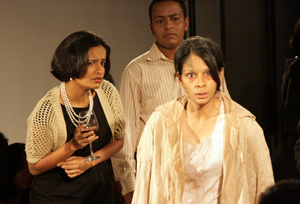Taking my seat in the Goethe-Institut, I had four thoughts:
1) The War Reporter, in German, turns out to be ‘Die Kriegsberichterstatterin’ – roughly, ‘the warreportstater(female)’. Germans enjoy words like this. Schoolboy legend has it that there is a (s.) German word for ‘therefereeofthefinalmatchofthefootballWorldCupfinals’ and also for ‘thecapofthecaptainoftheDanubeShippingCompany’. Though why one would need such words…
2) The play was to be performed not so much ‘in the round’ as ‘in the T’, along a gangway. This would mean the audience at one end would have trouble seeing action at the other. Also, the Goethe’s double-front-room layout doesn’t carry sound very well.
3) To judge from the programme (and publicity), the play’s producers seemed to be going out of their way NOT to make any point about the parlous state of journalism in Sri Lanka.
4) The razor wire was real, and yet no Health & Safety person had arrived to shut the show down. Cause for celebration. (The barbs weren’t very sharp, but they did snag the occasional lady’s handbag.)
More or less on those anon.
I have lately been preaching the virtues of good readership (privately), good listenership (in these pages), and good viewership (in class), and so I will confess: I did not get The War Reporter.
The fault, I am confident, is not with the production (except that they chose to put it on), nor with the actors (who were excellent, to a wo/man), but with Theresia Walser’s play, which springs from that reductive form of (central) European theatre that implies the whole cosmos can be understood if only one pays close attention to a couple of squares of pavement art or one of those feeble ‘living statues’ (beggars sprayed gold). This is a disastrous modern conceit, especially prevalent among high-lit. types: to believe not only that Everything Is Connected, but that it is all connected in cryptic and yet meaningful ways. It ain’t.
 |
| Scenes from The War Reporter |
 |
 |
I am mindful of Ford Madox Ford’s truism that ‘It is an easy job to say that an elephant, however good, is not a good warthog.’ But I can’t have been the only person who assumed The War Reporter – particularly when translated for performance in Colombo, in 2010 – would feature a war. Or, perhaps, a reporter (by which you and I both mean ‘journalist’). Suffice to say it involves neither. Nor is it about press freedoms, or freedom of speech in general. Not even obliquely.
Instead it concerns a gathering of colleagues for a linguistics institute awards ceremony, and a weird dishevelled woman who bursts through the hedge every now and then to spoil their evening by ranting about death and destruction in the surrounding gardens. Death and destruction which is quite clearly – to us and to the other characters – NOT going on.
So, what is the play about? And by ‘about’ I mean the story: what actually happens. I’ll give you one guess what actually happens. (Did you guess anything? Well, then, you were wrong).
So the war is not real. And if it’s a metaphor? A metafor WHAT? Not the slightest attempt is made to clue us in. (NB Just because something isn’t what it says it is, doesn’t mean it’s a clever metaphor (in disguise). Another bit of literary gobbledygook to trap the unwary.)
So we go back to the drinks evening. The institute’s employees fuss about the protection of their language, lest they one day wake up and find it unrecognisable (a fear largely alien to the ‘English’, whose language is largely alien). And of course it turns out those who are charged with protecting the language are all hypocrites and liars, or at a loss for words.
There is some neatly-scripted thoughtlessness. Cringing social embarrassments. Lots of angst (a fine German word). Someone’s wife gets drunk. Someone breaks the flush on the institute’s toilet. The War Reporter, by any other name, would have made a tidy comedy of manners. It could even have made a pretty stimulating play about linguistics. In fact, after about half an hour, with no sign of either war or reporter, I began to wonder, sitting in the lecture hall of a language institute, if I had indeed blundered into the wrong play. Was something else going on out in the garden (other than an invisible war, of course…)?
But the comedy isn’t that sustained, or language discussed in any great depth. Which takes us back to the war. Or the not-war. Or the meta-war. Even allowing for a little European abstraction, it doesn’t seem unreasonable to ask: What war is the war reporter reporting on? Or what metaphorical war does she think she’s reporting on? A personal war of her own? Some social conflict these ivory-tower linguistics geeks haven’t woken up to yet?
The programme tells us the war or ‘war’ is next door/‘next door’, so you don’t have to worry about it. Or maybe it says that it was indicative of how we don’t care about what’s going on next door (hard to follow, in the dark). The directors say that during Sri Lanka’s conflict they felt frustrated at the curtailing of their freedoms of expression. (Not nearly as frustrated as I was waiting for them to express themselves.) They also say that the play is ‘located within a very specific German playwriting context’ – Die Con-text der Totalische Bünkum, presumably.
Perhaps this is no more than one should expect from a playwright who adopts the lazy and self-serving belief that the play is not finished until it is performed (not-very-sub-text: if the audience don’t get it then the fault lies with them). Ms Walser also, not coincidentally, thinks it would be fun if the audience ‘were to detect something that not even she was aware of while writing’. I have a few suggestions.
But theatre-goers shouldn’t need to read the programme to know what’s going on in front of them. Nor to phone the director, for that matter. Expressing my confusion to a friend, afterwards, I was offered Jake Oorloff’s number, and I passed. The audience don’t get a hot-line to directorial explication; and neither should the critics. It breeds an artistic variant of Stockholm syndrome.
In a little graphic in The War Reporter’s artsy but vapid tabloid programme, there is a magnifying glass lying on an open dictionary. The entry under inspection is ‘Language’, and the only words one can make out are ‘communication’, ‘human beings’, ‘sounds spoken’, ‘systematized’ (an American dictionary? That explains nearly everything!). Perhaps, given the content of the play, the full definition ought to have been blown up and used as a poster – if only to remind the play’s producers of what, exactly, they’re supposed to be doing.
The cast quick-march onto the stage, the lights come up, music plays. Ah! we all realise, slightly too late: this must mean it is finished.
We shuffled out, contemplatively. And I heard – I swear it – one lady murmur to another: ‘Superb! What was it about?’
--------------------
It’s no coincidence that One Small Step was not only for kids but British too. We don’t really go all-out-allegorical on stage. Not since Ben Jonson, anyway.
The Punchi Theatre was sold out, and actually full, even on a horrible wet evening. I managed to bag a return ticket. (Good form, and thank you to whomever had the grace to actually return his return.) More interestingly for a kids’ show, the packed house was about ¾ adult – including a fair smattering of actors, directors and writers.
One Small Step is a two-man, Oxford Playhouse production, starring Robin Hemmings and Oliver Millingham, telling the story of the space race from the late 1940s through to the Apollo 11 moon landing. A totally inspiring tale, rendered accessible in just over an hour. Basically, The Right Stuff for kids.
The badly-dressed nerdiness and Chuckle Bros low-camp slapstick doesn’t really do it for me (I was never a child, but if I had been my parents would have taken me to see Peter Ustinov), but it worked a treat on those around me. Hemmings and Millingham – whichever was which – worked like, well, like trainee astronauts, burning the calories left and right across the stage, playing everyone from Chuck Yeager to Nikita Khruschev, in Austin Lawler’s frenetic and highly inventive a-coffee-can-could-easily-be-a-Saturn-V-rocket staging.
The play was frequently comic, but in legitimate educational terms (I took this to be part of its British-Council-funded remit) what it did best was capture the dangerously urgent nature of NASA activity in the ‘60s. Needless to say, the story has never been told from the Red side, so we have no idea what it was like over there. But the space race was no empty euphemism. People died trying to cross the line. What was also well conveyed was how far behind America was at every step, and how their arrival first on the moon was facilitated by a series of lucky breaks (e.g. the Baikonur explosion which wiped out a significant percentage of Russia’s astro-scientists).
Cool history trivia, too. Did you know Sputnik had orbited over America twice before the Yanks detected it? Embarrassing. And I was not aware that Werner von Braun had presented a Disney weekly TV show (which is a bit like putting Henry Kissinger in charge of the Peace Corps). In general, I got the impression the historical content was really more for the adults, and the style for the kiddies – like Aladdin. That said, a mother sitting next to me nearly wet herself laughing during a re-enactment of the catheterisation process (ironic, huh?).
The fun sound-tracking was also straight out of The Right Stuff, some of which humour was apparently a little tangential for 80% of the crowd, albeit the opening chords of Also Sprach Zarathustra were imaginatively rendered on loo rolls, a filing cabinet, and… is that guy playing a theremin?! They had a record-player, too, for the trickier music, and under the emotional guidance of Hans Zimmer – sorry, Gustav Holst – I felt a little tremor of excitement on behalf of the men who returned safely from the moon 40 years ago.
|




